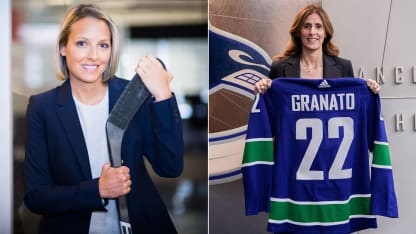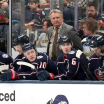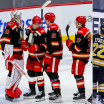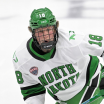VANCOUVER -- The light streams through the giant windows into Emilie Castonguay's office, over the balcony with the owl statue, onto the desk and the couch and the tiny plant. She says that, given the real estate prices in her new city, she should just sleep here on the couch, that she has asked to do so and been turned down, and it's not entirely clear whether she's joking.
It's a bustling office on this day in the middle of March. Henrik and Daniel Sedin each sits on the phone in their shared office nearby. Cammi Granato is across the way, and Jim Rutherford next door. In the middle is Patrik Allvin, tasked with taking the Vancouver Canucks into the next era, one that embraces the Sedins in their post-playing positions, and leaves them behind.
It all started with the simultaneous firings of general manager Jim Benning and coach Travis Green on Dec. 5, with the hiring of Rutherford on Dec. 9 as president of hockey operations, with the filling out of a front office that now looks like no other in hockey.
It was promised from the start, the new vision espoused by owner Francesco Aquilini and borne out by hirings made by Rutherford, ones that were years in the making.
Because it was more than a decade ago that Rutherford had first considered it, a vow made to himself that, should he ever be in the position to do it, and with the right candidates to make it work, he would diversify the notoriously homogenous world of NHL front offices.
Which he did, hiring Castonguay on Jan. 24, and then Granato on Feb. 10, making them the first two women to hold the title of assistant general manager of an NHL team. (Angela Gorgone, who was widely reported to have been an assistant general manager with the Mighty Ducks of Anaheim in 1996-97, was actually the assistant to the general manager, according to then-GM Jack Ferreira.)
On Jan. 27, Rutherford made Allvin the first Sweden-born general manager in NHL history and the second GM born in Europe, with Jarmo Kekalainen (Finland) of the Columbus Blue Jackets hired in 2013 as the first. Rutherford also hired 25-year-old Rachel Doerrie for the Canucks analytics department. The Sedins joined the front office on June 22, 2021, as special advisers to the GM.
"The kind of front office that we have right now is something I've thought about for probably 10, 12 years," Rutherford said. "I didn't just come to Vancouver and say, 'Oh, I think we'll try to do something different.'"
He hadn't made seismic changes to the front office while overseeing the Pittsburgh Penguins from 2014 to Jan. 27, 2021, when he resigned as GM. Prior to that, Rutherford had been the GM and president of the Hartford Whalers/Carolina Hurricanes from 1994 to 2014. He had inherited many of the staff members in Pittsburgh, and the Penguins eventually became a juggernaut, winning the Stanley Cup in 2016 and 2017.
But this time, it was time. It was right. He had hours to think through his plans as he traveled between his home in North Carolina and Vancouver, hours to ponder the exact composition of his front office, the people he believed could push the organization forward.
"I thought, now I can do what I've wanted to do," Rutherford said.
* * * *
But it almost didn't happen, at least not this way.
When Castonguay's phone rang and Rutherford's number popped up, she didn't answer. At the time, she was a player agent and she knew she had no players in Vancouver. She believed there was a chance that the call was about a job, though she did not know what sort. She texted him back, letting him know she would call back the next day.
She thought about her sister, Valerie, and the prophecy that she had made all those years ago.
It was back in 2008, right after Castonguay's shoulder surgery and the end of her playing days, when Valerie told her sister she would go on to become a lawyer and eventually the GM of the Canucks. She said it with such certainty that Castonguay still marvels.
It was the last thing Valerie would ever say to her.
She died the next day, having gone in for a routine plastic surgery. She was 25 years old.
And, still, Castonguay said no when Rutherford offered a path to that life.
Castonguay wasn't yet ready to leave her clients or her business partner, Olivier Fortier with Momentum Hockey, where she had represented New York Rangers forward Alexis Lafreniere, among others. She thought someday, maybe, eventually, but not now. Rutherford wasn't about to let her decline so quickly. He convinced her to take some time, arguing persuasively that jobs like this one didn't come around often.
She asked for the weekend to think.
"I had this epiphany that deep down my gut was saying, 'Don't pass on this,'" she said. "My loyalty and my obligations and my sense of duty and my love for my players and my families that I represented was what was holding me back."
Fortier had asked her what she would say if, when she queried all of those players and those families, they told her to do it, cheered her on and told her they were behind her.
On Monday, she said yes.
She had rarely been intimidated before in her career. She didn't want to start now.
"I thanked him for not taking no for an answer," Castonguay said.
Castonguay, who has a law degree from l'Universite de Montreal, is in charge of the NHL salary cap, the NHL/NHLPA Collective Bargaining Agreement and contracts among the usual assistant GM duties, including player evaluation and trade discussions.
"I think she's extremely detailed," Allvin said. "A great work ethic, open-minded, eager. She comes in obviously from a player agent perspective into more of a now you're on the team. So it's a bit of a different approach how you deal with the players and the agents."
It's a job that fits her and her skills, a job that brings her to a place that felt like home, a place where she believed she would eventually settle. It was where she had hoped to come with Valerie, a place they had dreamed about visiting, a place to ski and live, a dream destination, a place they would now never go together. It was where she spent a month after her sister's death, grieving what would never be.
"I scattered her ashes at a certain spot in Vancouver, so I'll go there [after the season] and kind of realize what's happened. It's pretty special. It's things that you don't really know how to put into words or explain."
Asked if she feels settled in Vancouver, she said, "My heart's always been here."
* * * *
Granato, meanwhile, has been here all along. Since Sept. 25, 2019, she had staked out a seat in the press box at Rogers Arena as the first woman to be a pro scout in the NHL, for the Seattle Kraken. It was a job that seemed perfect for her at the time, allowing her to enter the world of the NHL without having to uproot her Vancouver-based family.
And a job that, really, she never thought she'd get.
Granato recalls, vividly, when her mother sat her down at 12 years old to suggest, gently, that she might want to pick a different sport. She had taken her daughter into the living room -- a space reserved for Christmas, or for serious talks -- and told her that the future simply wasn't there in hockey.
Granato was devastated.
"I have a family of hockey players in my house, four of us played out of the six [siblings]," she said. "And we all dreamed the same thing. And the day that I came to realize that my dreams couldn't be what theirs could be was really sad. It was a tough day."
She persevered, becoming part of the initial United States women's national teams and winning the gold medal in the 1998 Nagano Olympics, the first chance women had to compete in hockey. She earned silver in the 2002 Salt Lake City Olympics and in 2010 became the first woman inducted into the Hockey Hall of Fame.
But she still remembers that day, running up the stairs, crying. Feeling defeated that her path could not be the same as her brothers' path. She remembers joking that she might have to figure out a way to buy a team because that would be the only way she could work for an NHL organization.
"It was one of those things where it's actually not possible because you've never seen a woman in a role like that," Granato said. "Just as it's not possible for a woman to play in the NHL. It wasn't in the realm of my thinking."
And then, suddenly, it was.
It would have been difficult to turn down an opportunity at that level but, importantly, Granato wanted to feel like she had an opportunity to succeed in the role. With the Canucks, she felt that. She felt she would have every chance to make good on the work she has put in over the years, on her hockey knowledge and understanding, on the leadership she brings, being placed in charge of player development, amateur and pro scouting, with the directors of those divisions reporting to her, in addition to the player evaluation and trade discussion pieces.
So far, Granato has been settling herself into an office that desperately needs a coat of paint, a bookcase, some family photos, a personality. She has been learning the strengths and weakness of the organization, of its systems, familiarizing herself with what needs to happen and what she needs to do to make that happen. It all feels right.
"There's no agenda for [Rutherford], except that he wants your hockey mind," Granato said. "He wants different people's views and, if you look at the staff, the way we're staffed, what is a positive about having different minds and different strengths because now you're drawing from all that. And I think that's what's really exciting."
* * * *
When Rutherford brought in candidates for assistant general managers -- five of them women -- he wasn't going to force it. He didn't go in with the idea that he had to hire a woman, only that he wanted to, if it fit.
"I wasn't going to say, 'Now's the time. Let's just do this now,'" he said. "It had to work."
Which was important to both of the women he did hire.
"Maybe if he would have done it just to do it, that person would have failed and that would have set us back," Castonguay said. "Me and Cammi have a responsibility here, to make sure that we do things right and we prove that we're qualified to do this job. I don't think we take that lightly, at all."
It's a responsibility they share, each taking some weight off the other, those expectations, the added eyeballs and scrutiny. But it's also something that Castonguay has continually pushed back against over her career. It's something that frustrates her, that this is still a story, that she is still looked at through the lens of her gender.
"That stigma or belief, saying that we have to be walking miracles as women to work in sports. No, it shouldn't be like that," Castonguay said. "I hope we get to the point where we normalize it and we're kind of done making a big deal out of it. Because it adds pressure that shouldn't be there, and it also puts us in a category of supernatural or something. Like we have these superpowers that normal women don't have. Which is not true.
"We're normal people that worked hard and set goals and gained the knowledge and weren't scared to go in the direction of our dreams. It doesn't take superpowers to do that. It just takes courage and passion."
And someone willing to consider nontraditional candidates, whether that's Castonguay or Granato or Allvin or Doerrie, whether that's women or people of color, whether that's candidates with different abilities or different paths. It's something the NHL has been working toward, building toward, something that has accelerated of late.
"Momentum is the word I would use," NHL senior executive vice president and chief marketing officer Heidi Browning said during a panel discussion at the 2022 Honda NHL All-Star Weekend in February, after the hiring of Castonguay and before the hiring of Granato. "It's so wonderful to see. And it seems to be picking up speed, just like momentum does. Every day we're hearing a new story of somebody who's being elevated."
The League has been slowly creeping in this direction for years, diversifying beyond the usual candidates for the usual jobs, seeing women make inroads into scouting and analytics staffs, seeing breakthroughs, even though the NHL remains behind other sports like Major League Baseball, which saw its first women hired as a GM, Kim Ng of the Miami Marlins, in 2020.
"It's important," Rutherford said. "And if there's not, we're missing out on a lot."
That diversity of opinions, of backgrounds, of beliefs has yielded a collaborative front office in Vancouver, a group that will sit there for hours, debating, considering, thinking through alternative options. A group of smart, capable thinkers who not only have high hockey IQs, but also high emotional intelligence, as Castonguay said of Allvin.
"Obviously from a traditional hockey front office perspective, it's definitely different," Allvin said. "The biggest thing for me is that I don't have all the answers. I need you guys to give me the answers. I might have a lot of questions, so I want the answers and solutions."
Those solutions are coming, now. The Canucks (32-26-9) feel good about where they are, with a core of young players, an excellent goalie in Thatcher Demko and the beginnings of a team that could contend. They are finding their stride under coach Bruce Boudreau and are three points behind the Vegas Golden Knights for the second wild card into the Stanley Cup Playoffs from the Western Conference entering their game at the St. Louis Blues on Monday (7:30 p.m. ET; SN, BSMW, ESPN+, NHL LIVE).
This new front office, now, is tasked with getting Vancouver's salary cap situation under control, with strengthening a farm system that has graduated most of its stellar talent, with readying the Canucks to move up the standings and into the NHL's elite, with finding a way to build a championship mentality.
"We have a foundation here to build a team," Rutherford said. "Our goal is to build it into a contender, just like everybody else. To start with, we have to unravel some things to build it toward where we want to build it. And long term is to win a Cup."
That, still, is in the future.
But here, in Vancouver, the future -- of the Canucks, of the NHL -- feels closer than it has before.
As Rutherford talks about his most recent hires, he notes that he has a vast management web, having worked with executives who have developed into a generation of GMs: Bill Guerin (Minnesota Wild) and Tom Fitzgerald (New Jersey Devils) and Ron Francis (Kraken) and Jason Botterill (formerly GM of the Buffalo Sabres).
He won't take credit, believing that they would have gotten there anyway, citing their own hard work in putting themselves in that position, but he takes pride that he was able to give them an opportunity, like he has with Castonguay and Granato, with Allvin and Doerrie.
And, a decade after he started thinking about a future that is now the present, he once again looks ahead.
"I've had the good fortune of working with people who have gone on to be GMs," he said. "I would like to think that's what's going to happen here."


















